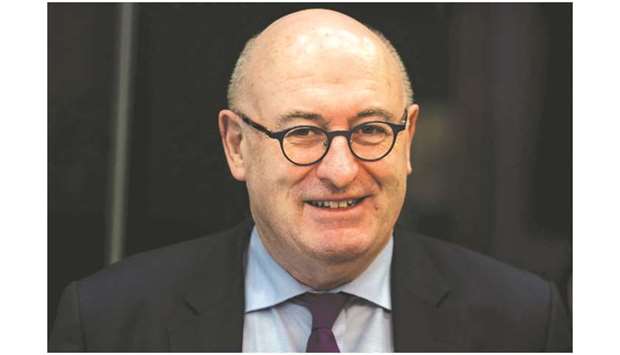The European Union’s trade chief signalled that post-Brexit Britain and the EU would struggle to reach a free-trade agreement before the end of 2020, highlighting the persistent risk of UK commercial ties with the bloc being severed in a disruptive way.
“We have no accurate way to predict how long it will take to negotiate a deal with the UK because there is no precedent,” Phil Hogan said in the text of remarks due to be delivered yesterday in Dublin. “We are entering completely uncharted waters.”
The remarks signal that economic uncertainty will continue to plague the UK even if Prime Minister Boris Johnson wins a national election next week and gains the British Parliament’s approval of a Brexit agreement by a January 31 deadline.
Under the terms of the withdrawal accord, a transition period preserving the economic status quo would run until the end of 2020 and could be prolonged by as long as two years while both sides negotiate a free-trade deal. A decision to prolong the transition phase would have to be taken by the middle of next year. “A number of British newspapers quoted me out of context to indicate that I believed a deal was achievable before the end of 2020,” Hogan said. “The most productive thing the UK government could do at this point is to focus on content, not timing.”
The negotiations promise to be tricky because they will involve trying to ensure a close degree of economic integration that nonetheless will fall short of the benefits offered by EU membership. It took the EU five years to strike market-opening accords with Japan and Canada and two decades to get a deal with the Mercosur group of Argentina, Brazil, Paraguay and Uruguay.
Hogan said the EU and UK have the advantage of already enjoying barrier-free commerce. At the same, he said, little is known about Britain’s goals on post-Brexit ties to the bloc.
“We are absolutely not starting from scratch; we should be able to square off many areas of alignment relatively quickly, due to the high level of convergence already in place,” Hogan said.
“We are still in the dark as to what type of free-trade agreement the UK will ultimately want. So the urgent priority for the next government must be to outline its preferences, and then carefully define its offensive and defensive interests for each stage of negotiations.”
On a separate priority for Hogan, who took office as the EU trade commissioner this week, he vowed to work to uphold the World Trade Organization system being challenged in different ways by the US and China while citing the need for a revamp of the WTO to make it more effective.
“The WTO is no longer fit for purpose in today’s highly integrated and technology-driven global economy,” he said.
“We urgently need to reform the WTO to make it relevant and operational again.”

Hogan: Entering uncharted waters.
